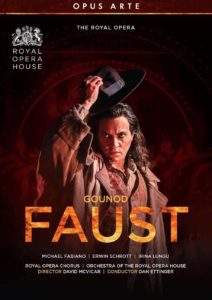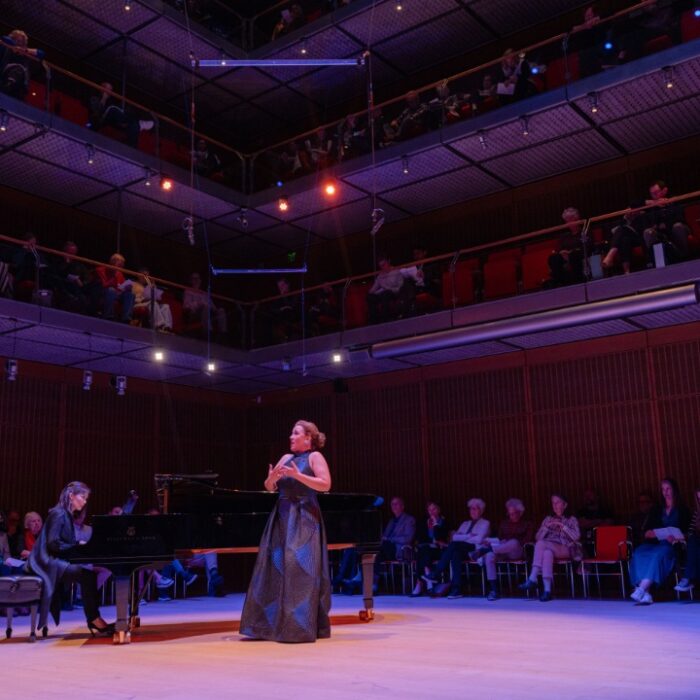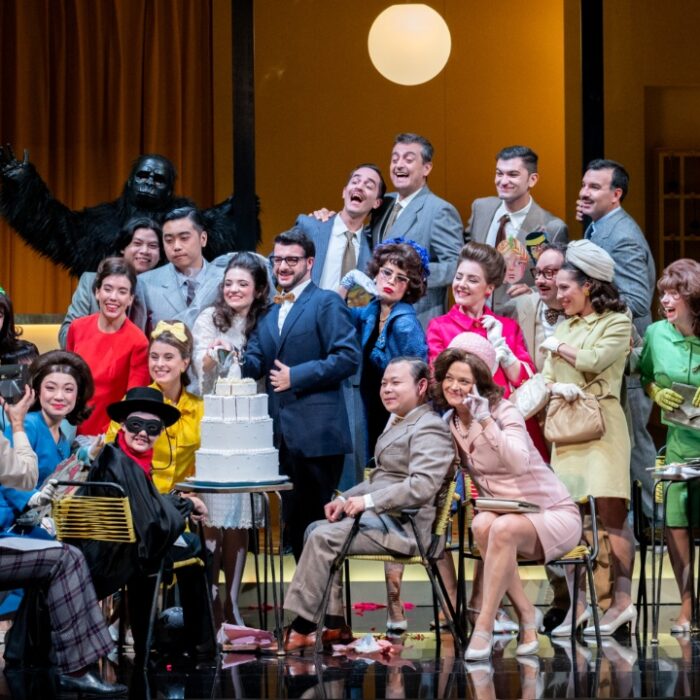
DVD Review: The Royal Opera House’s ‘Faust (2018)’
Irina Lungu & Michael Fabiano Lead a Pristine Recording of Gounod Masterpiece from ROH
By Mauricio VillaOpus Arte, the label which records the performances of The Royal Opera House, has released the second recording of Sir David McVicar’s production of “Faust” (the first DVD was released in 2010 from the premiere of this production in 2004). The production, from 2018, features a luxury cast of singers in what is probably the best production of “Faust” in recent years.
This production of “Faust” debuted in London in 2004 with Roberto Alagna, Angela Gheorghiu, and Bryn Terfel in the principal roles and has been frequently revived over the last 14 years with singers like Piotr Beczala, Joseph Calleja and Vittorio Grigolo in the title role. It is set in Paris around the time “Faust” was written by Gounod, and has a strong presence of theater versus religion.
The stage features a theatre box on one side and a church organ in a gallery of Gothic arches on the other. But besides this metaphor of theater and spirituality there is hyperrealism in the sets designed by Charles Edwards. The production has a large number of dancers and extras who appear constantly throughout the show. There are also countless theatrical effects like the crucifix that bleeds wine and later tears apart; the church sculpture that comes to life as Méphistophélès; and the use of classical trapdoors. The use of ballet and acrobatics helps maintain the liveliness of the action, with modern readings of a Moulin Rouge can-can during the Act Two waltz and a homage to the romantic ballet “Giselle” during the Walpurgis Night scene.
Dominance from the Cast
American tenor Michael Fabiano is no stranger to the title role, which he debuted in Amsterdam in 2014 followed by performances in Houston and Sidney, where this same production was presented. His lyrical—with a tendency toward spinto—voice suits Gounod’s score impeccably and he is able to comply both with the baritonal tessitura of the old Faust as well as the lyric lines of the rest of the opera.
He delivers strong and secure high notes, like the high B natural on “Je t’aime” in Act Two, or two similar high notes that take place during the final trio. If we take into consideration that the final sound mix of the DVD is faithful to the real voices on stage, Fabiano’s voice rings over Erwin Schrott and Stéphane Degout in the trio during Act Four, especially on the high B flats.
Fabiano gives an excellent lesson of a depurated French style, keeping a fluid vocal line during the most lyrical parts of the role, including his aria “Salut demeure chaste et pure,” where he sings the high C with an exquisite pianissimo; or the long duet in Act Two with Marguerite, where he shows off the chiaroscuro of his voice, coloring the sound and delivering a soaring mezza voce in moments like “comme dans un nuage” or “ô nuit d’amour.” He proves to be ardent and dramatic during the first act, the duel trio, and the final scene.
His personification of the old Faust is irreproachable, presenting a hunched shaky old man in contrast with the cheerful ardent lover in the second and third act. Most compelling is the remorseful Faust of the fourth and fifth acts. He really delivers a remarkable performance through and through.
The bass-baritone Erwin Schrott sang the part of the devil Méphistophélès. He gives a brilliant, secure, and amusing performance, dominating both extremes of the tessitura, the higher and the lower registers. He shines in his first act aria “Le veau d’or,” which has uncomfortable writing constantly navigating around E flat. He shows his lyricism and mezza voce in moments like “Il était temps” and his fourth act aria “Vous qui faites l’endormie,” and his secure high notes, by interpolating a high F on his entrance or a final long high F sharp during the church scene.
Schrott is a theatrical animal presenting strong characterizations of his roles, but he lacks contrast and depth in his personification of Méphistophélès. He opts to present an ironic wild party animal, which turns out to be amusing and brilliant, but there are moments when the result is too clownish and overacted. It would be much more interesting if he had explored the multiple layers of this difficult character, rather than seeking the easy laugh of the audience.
Irina Lungu stepped into the role of Marguerite on short notice when two sopranos fell sick. She had performed the role of the innocent girl in the opera houses of Amsterdam, Torino and Madrid before, so she was secure in this demanding, long role. She has a lyrical, leggera, dark voice, with a velvet timbre quality and a marked vibrato with a depurated control of scales and trills which she exhibited during the famous “Jewel aria” of the third act. She delivered a showcase of secure high notes, like the final high B natural of the “Jewel aria” and two brilliant high Cs during the garden duet in Act three. She also possesses a strong middle register that enables her to inject dramatism into the church scene in Act Four and the final prison scene.
She portrayed a mature development of the role, both vocally and dramatically, from the naive religious girl to the abandoned mother who falls into madness and kills her own child. She gives a terrifying performance in the church scene where she has no fear in screaming and moaning. Her maniacal laugh after Valentin’s death is hair-raising and her personification of the tormented Marguerite in the final scene is brilliant. It is only a pity that she has to wear an lauhgable false blond wig throughout the entire performance.
The work of Stéphane Degout and Marta Fontanals-Simmons—as Valentin and Siebel respectively—is magnificent, both stylish and dramatic in their short but important roles.
It is also important to mention the brilliant participation of the Royal Opera Chorus which plays an important role in this opera, with strong performances in the several appearances during Act Two and a bombastic interpretation of the famous soldier’s chorus “Gloire immortelle de nos aïeux.” The chorus sounds dramatic and effective in the church scene and Valentin’s death and sparkling during the final redemption choir that closes the opera.
Dan Ettinger is in charge of the Royal Opera Orchestra. He gives a detailed reading of the score, pointing out the string sections to create strong atmospheres, like the first bars of the first scene after a forceful and firm overture. From the pit, he extracts a deep sense of spiritualism during the church scene, Valentine’s death, and the final bars of the opera, while being heroic and resonant during the soldier’s chorus and Walpurgis Night.
The score is severely cut, as it usually is to avoid a four-hour-long performance. Noticeably absent is Marguerite’s room scene in Act Four and Faust’s rarely-performed aria during the Walpurgis Night scene. On the other hand, the ballet music is almost complete.
A must-have DVD
The appearance of the DVD recording is impeccable, maintaining the high standards for which Opus Arte is known. This is probably the company that is currently releasing the most opera DVDs, and is consequently experienced in filming and editing them. The company used footage from two performances so that it could correct camera angles and even choose between both performances to select the moments where the singers were at their best.
The result is spectacular. The light on the stage is well-proportioned and you can see the sets clearly. The filmmakers kept a good balance between close-ups and general shots in the ballet so you never missed a singular step or figure, and it is very demanding to shoot ballet in such a way that the essence of the whole choreography is preserved.
The DVD includes three extra features with interviews and rehearsal footage from the singers and the conductor.
This recording is a must for lovers of opera and especially, the French repertoire. A magical, splendid production with a cast of non-native French singers—except for Degout as Valentin—who are all stylish and vocally impressive. One of the best “Faust” performances you can currently see from the comfort of your home.


